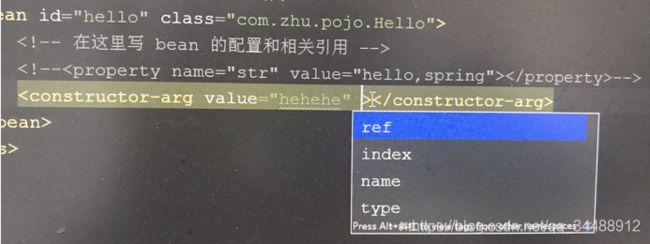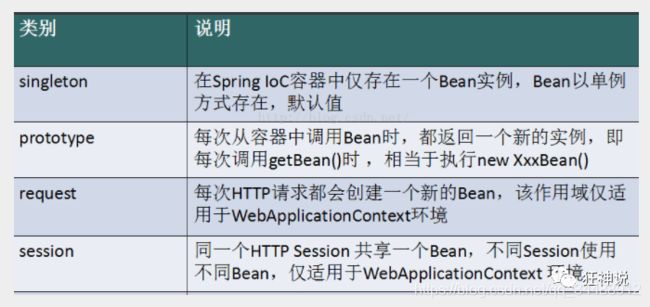Spring入门之IOC创建对象、Spring配置、依赖注入、Bean作用域
1.IOC创建对象的方式(实例化Bean)
方式一
使用默认无参构造。要求必须有默认的无参构造函数,且在配置文件中使用bean标签,只有id和class属性。
<bean id="hello" class="com.zhu.pojo.Hello"/>
方式二
使用实例工厂的方法创建对象。
public class Bean3Factory {
public Bean3 getBean3(){
return new Bean3();
}
}
<!-- 先获取工厂 -->
<bean id="bean3factory" class="com.spring.demo.Bean3Factory"></bean>
<!-- 再调用工厂中的方法-->
<bean id="bean3" factory-bean="bean3factory" factory-method="getBean3"></bean>
方式三
使用jingta工厂的方法创建对象。
public class Bean2Factory {
public static Bean2 getBean2(){
return new Bean2();
}
}
<!-- 关键部分 -->
<bean id="bean2" class="com.spring.demo.Bean2Factory" factory-method="getBean2"></bean>
</beans>
2.Spring相关配置
2.1别名
alias 设置别名 , 为bean设置别名 , 可以设置多个别名。
<!--设置别名:在获取Bean的时候可以使用别名获取-->
<alias name="userT" alias="userNew"/>
<!--bean就是java对象,由Spring创建和管理-->
<!--
id 是bean的标识符,要唯一,如果没有配置id,name就是默认标识符
如果配置id,又配置了name,那么name是别名
name可以设置多个别名,可以用逗号,分号,空格隔开
如果不配置id和name,可以根据applicationContext.getBean(.class)获取对象;
class是bean的全限定名=包名+类名
-->
<bean id="hello" name="hello2 h2,h3;h4" class="com.kuang.pojo.Hello">
<property name="name" value="Spring"/>
</bean>
2.2import
团队的合作通过import来实现 。
<import resource="{path}/beans.xml"/>
3.依赖注入
3.1 构造器注入
<bean id="hello" class="com.zhu.pojo.Hello">
<constructor-arg value="hehehe"></constructor-arg>
</bean>

找给谁赋值:
index:参数在构造函数中的索引位置
type:参数在构造函数中的数据类型
name:参数在构造函数中的名字
赋的什么值:
value:基本数据类型+String
ref:引用其他的bean
**特点:**必须有有参构造函数,必须注入数据,不管用不用得到,改变了Bean实例化对象的方式,不能使用默认的无参构造了。在类中要写有参构造方法。实际开发中一般不用这种方法。
3.2 set方法注入
3.2.1 创建Student类,Address类
public class Student {
private String name;
private Address address;
private String[] books;
private List<String> hobbies;
private Map<String,String> card;
private Set<String> games;
private String wife;
private Properties info;
public Address getAddress() {
return address;
}
public void setAddress(Address address) {
this.address = address;
}
public String getName() {
return name;
}
public void setName(String name) {
this.name = name;
}
public String[] getBooks() {
return books;
}
public void setBooks(String[] books) {
this.books = books;
}
public List<String> getHobbies() {
return hobbies;
}
public void setHobbies(List<String> hobbies) {
this.hobbies = hobbies;
}
public Map<String, String> getCard() {
return card;
}
public void setCard(Map<String, String> card) {
this.card = card;
}
public Set<String> getGames() {
return games;
}
public void setGames(Set<String> games) {
this.games = games;
}
public String getWife() {
return wife;
}
public void setWife(String wife) {
this.wife = wife;
}
public Properties getInfo() {
return info;
}
public void setInfo(Properties info) {
this.info = info;
}
@Override
public String toString() {
return "Student{" +
"name='" + name + '\'' +
", address=" + address.getAddress() +
", books=" + Arrays.toString(books) +
", hobbies=" + hobbies +
", card=" + card +
", games=" + games +
", wife='" + wife + '\'' +
", info=" + info +
'}';
}
}
public class Address {
private String address;
public String getAddress() {
return address;
}
public void setAddress(String address) {
this.address = address;
}
}
3.2.2 编写bean.xml
<?xml version="1.0" encoding="UTF-8"?>
<beans xmlns="http://www.springframework.org/schema/beans"
xmlns:xsi="http://www.w3.org/2001/XMLSchema-instance"
xsi:schemaLocation="http://www.springframework.org/schema/beans
http://www.springframework.org/schema/beans/spring-beans.xsd">
<bean id="add" class="com.zhu.pojo.Address">
<property name="address" value="清水"></property>
</bean>
<bean id="stu" class="com.zhu.pojo.Student">
<!--常量注入-->
<property name="name" value="zhulin"></property>
<!--bean注入-->
<property name="address" ref="add"></property>
<!--数组array注入-->
<property name="books">
<array>
<value>西游记</value>
<value>红楼梦</value>
<value>三国演义</value>
<value>水浒传</value>
</array>
</property>
<!--列表List注入-->
<property name="hobbies">
<list>
<value>唱</value>
<value>跳</value>
<value>Rap</value>
<value>篮球</value>
</list>
</property>
<!--Map注入-->
<property name="card">
<map>
<entry key="姓名" value="朱琳"></entry>
<entry key="学号" value="119110022293"></entry>
</map>
</property>
<!--集合Set注入-->
<property name="games">
<set>
<value>LOL</value>
<value>王者农药</value>
<value>和平精英</value>
</set>
</property>
<!--null注入-->
<property name="wife"><null></null></property>
<!--properties注入-->
<property name="info">
<props>
<prop key="学号">119110022293</prop>
<prop key="银行卡号">621456879</prop>
</props>
</property>
</bean>
</beans>
3.2.3测试
public class testtt {
public static void main(String[] args) {
ApplicationContext context = new ClassPathXmlApplicationContext("bean.xml");
Student stu = (Student) context.getBean("stu");
System.out.println(stu.toString());
}
}
Student{name='zhulin', address=清水,
books=[西游记, 红楼梦, 三国演义, 水浒传],
hobbies=[唱, 跳, Rap, 篮球],
card={姓名=朱琳, 学号=119110022293},
games=[LOL, 王者农药, 和平精英],
wife='null',
info={学号=119110022293, 银行卡号=621456879}}
3.3 c命名空间和p命名空间注入
3.3.1 P命名空间注入 : 需要在头文件中加入约束文件
导入约束 : xmlns:p="http://www.springframework.org/schema/p"
<!--P(属性: properties)命名空间 , 属性依然要设置set方法-->
<bean id="user" class="com.kuang.pojo.User" p:name="狂神" p:age="18"/>
3.3.2 c 命名空间注入 : 需要在头文件中加入约束文件
导入约束 : xmlns:c="http://www.springframework.org/schema/c"
<!--C(构造: Constructor)命名空间 , 属性依然要设置set方法-->
<bean id="user" class="com.kuang.pojo.User" c:name="狂神" c:age="18"/>
c 就是所谓的构造器注入(有参构造)
4. Bean的作用域
<bean id="ServiceImpl" class="cn.csdn.service.ServiceImpl" scope="singleton">
